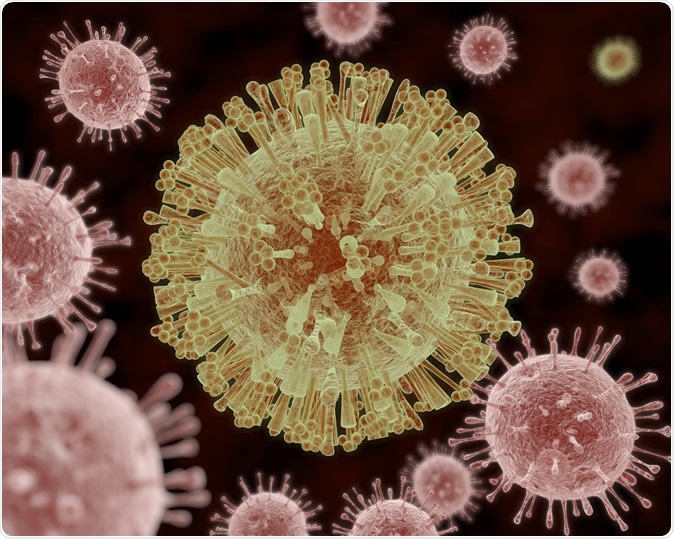Tel Aviv scientists have discovered certain genes that protect the host organism against attack by Zika virus, raising hopes of an eventual vaccine or cure for this dreaded viral disease.
The Zika virus, which is rampant in South America, can cause severe damage especially to unborn babies, including fetal death or stillbirth, or serious birth defects which are collectively called the congenital Zika syndrome. This includes such issues as a significant and crippling reduction in head size (microcephaly), neurological anomalies, and retarded development. Over 60 million people have been affected so far by this insect-borne virus, which can also cause the paralyzing disease Guillain-Barre syndrome and other nerve illnesses. However, scientists have not come up with a vaccine or cure for this devastating disease.

An illustration of the Zika Virus, which symptoms include mild headaches, maculopapular rash, fever, malaise, conjunctivitis, and arthralgia. - Illustration Credit: AuntSpray / Shutterstock
The current study from Tel Aviv University made use of a genetic screen for the entire genome, using a modified gene-editing technique based on CRISPR-Cas9 technology. This is a platform derived from nature, and plays a role in editing the genome in bacteria under natural conditions. It has been adapted for use in mammalian cells under experimental conditions.
The system is built around the bacterial enzyme Cas9 which both locates specific gene locations along the DNA strands in humans and can modify them. By introducing a genetic modification into the Cas9, the system is changed to a variant called CRISPR activation. This helps researchers achieve gene expression in the same loci as they would be normally found in nature.
This modified CRISPR activation system is of great utility when it comes to finding genes that can protect against viral infection. The process begins with activating all of the genes in the genome of a cultured cell using their own promoters in the DNA strand. The cells are then allowed to be infected with the Zika virus. Most of the cells die of the infection. In the survivors, the reason is to be found in the high levels of expression of some genes which are therefore protective against the infection.
The next step for the researchers was to use next-generation genome sequencing technology coupled with advanced bioinformatics to reveal the survival genes. These included some genes called interferon-stimulated genes or ISGs which are already known to protect the organism against other viral infections. Subsequently, the researchers found that two of these genes were most likely to be the ones responsible for staving off the infection. These are IFNL2 and IFI6.
When activated, these genes offered strong protection against viral infection at an early stage. Even when cells were infected in the presence of these genes, they showed a lower rate of cell death compared to those which were negative. These genes therefore rescue cells exposed to Zika virus either from the infection itself or from associated cell death.
The current study focused on one of the identified genes, namely, IFI6. Lead researcher Ella Sklan says, “IFI6 showed high levels of protection against the Zika virus both by protecting cells from infection and by preventing cell death.”
Next, the team examined placental tissue from Zika-infected mothers who had given birth. This was because the placenta provides an entry point for the transmission of the virus from the mother to the fetus before birth. The researchers found a higher expression of these protective genes in infected placental tissue, suggesting a potential role in protecting the placenta against infection as well.
The importance of this finding is in revealing some important factors that help keep out Zika virus infection from exposed cells. Sklan explains, “Our results provide a better understanding of key host factors that protect cells from Zika infection and might assist in identifying novel antiviral targets.”
However, nobody knows yet how the gene works to do this. The search is on for the mechanism of protection, which could enable scientists to develop new types of antiviral therapy against a whole family of viruses like Zika. CRISPR activation technology has also proved its worth in identifying protective host factors in infections.
The study was published in the Journal of Virology on May 29, 2019.
Source:
Journal reference:
A CRISPR activation screen identifies genes protecting from Zika virus infection
Anna Dukhovny, Kevin Lamkiewicz, Qian Chen, Markus Fricke, Nabila Jabrane-Ferrat, Manja Marz, Jae U. Jung, Ella H. Sklan, Journal of Virology May 2019, JVI.00211-19; DOI: 10.1128/JVI.00211-19, https://jvi.asm.org/content/early/2019/05/23/JVI.00211-19